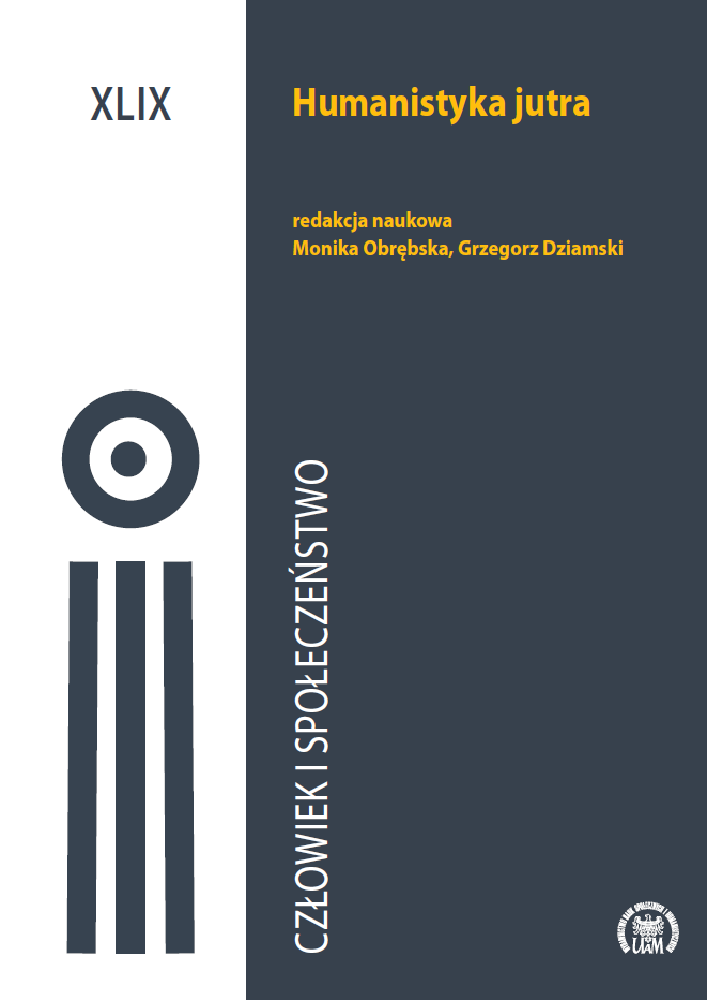Abstract
A canon is a word of religious origin. It constituted a basic aim of education at the university level. However, that time came to an end when the idea of universality was replaced with the idea of perfection (implicitly a clerk-like perfection). Ressentiment (a repressed feeling, described by Nietzsche and later by Scheler) acts against a higher ability to enjoy cultural pleasure; it creates a contemporary human as a man of labour and utility who cannot make use of the so-called cultural assets (from the canon). Depending on which field the idea of a canon refers to, we will understand it as such. It is most associated with art where it functions as a set of models, rules and methods of creation current in a given period of culture. There are three semantic fields of the background needed to examine the notion of a canon: culture, time and space (I dedicated two chapters of the paper to each). Today, a humanist has completely new roles, since not only did culture change but also time and space – the basic “forms of sensuality”, which Kant defined as our main point of orientation and a ground for thinking about the world. Coping with the canon was mainly intended to teach good choices, not only the choices regarding texts. It may be the most important mission of humanists: to show the canon and teach how to choose one of our own. Now we are observing a kind of fear of the canon (Bloom).
We are irritated with what we cannot understand. The biggest load of ressentiment lies within society, in which social equality, both political and formal, goes hand in hand with very large discrepancies in terms of actual power, wealth and education. Today, humanist reflection on culture even left the political level, related to knowledge, and entered a lower, more fundamental level connected with satisfying basic needs. The only role of a contemporary “humanist” is to free themself of illusions, i.e. also of the excess of texts. Our globalised space is ruled by quick rankings and summaries of texts. We lost the need to which art responded – to determine the eternal perspective of life.
References
Barthes, R. (1979). Wykład (fragmenty wykładu inauguracyjnego w Collège de France 7 stycznia 1977 roku), tłum. T. Komendant. Teksty, 5, 9–29.
Barthes, R. (2000). Mitologie, tłum. A. Dziadek. Warszawa: KR.
Baudrillard, J. (2006). Przemoc wirtualnej i zintegrowanej rzeczywistości, tłum. M. Salwa. Sztuka i Filozofia, 29, 15–31.
Bloom, H. (2019). Zachodni kanon. Książki i szkoła wieków, tłum. B. Baran, M. Szczubiałka. Warszawa: Aletheia.
Broch, H. (1998). Kilka uwag o kiczu i inne eseje, tłum. D. Borkowska, J. Garewicz, R. Turczyn. Warszawa: Czytelnik.
Doda-Wyszyńska, A. (2016). Pułapki przedstawienia. Filozofia przez pryzmat praktyk montażu pojęć. Poznań: Wydawnictwo Naukowe Wydziału Nauk Społecznych UAM.
Doda-Wyszyńska, A. (2019). Zarządzanie martwymi. Ironia eschatologii. Poznań: Wydawnictwo Naukowe Wydziału Nauk Społecznych UAM.
Eco, U. (1996). Nieobecna struktura, tłum. A. Weinsberg, P. Bravo. Warszawa: KR.
Foucault, M. (2009). Le corps utopique; suivi de Les hétérotopies. Paris: Éditions Lignes.
Foucault, M. (2013). Kim pan jest, profesorze Foucault? Debaty, rozmowy, polemiki, tłum. K.M. Jaksender. Kraków: Libron.
Foucault, M. (2014). Rządzenie żywymi, tłum. M. Herer. Warszawa: Wydawnictwo Naukowe PWN.
Girard, R. (2018). Apokalipsa tu i teraz, rozmawiał B. Chantre, tłum. C. Zalewski. Kraków: WAM.
Luhmann, N. (2016). Pisma o sztuce i literaturze, tłum. B. Baran, Warszawa: Wydawnictwo Naukowe Scholar.
Łotman, J. (2008). Uniwersum umysłu. Semiotyczna teoria kultury, tłum. B. Żyłko. Gdańsk: Wydawnictwo Uniwersytetu Gdańskiego.
Readings, B. (2017). Uniwersytet w ruinie, tłum. S. Stecko. Warszawa: Narodowe Centrum Kultury.
Scheler, M. (2008). Resentyment a moralności, tłum. B. Baran. Warszawa: Aletheia.
Toffler, A. (1997). Trzecia fala, tłum. E. Woydyłło. Warszawa: Państwowy Instytut Wydawniczy.
License
1. W momencie złożenia pracy celem rozpoczęcia postępowania w sprawie publikacji, Licencjodawca, zwany dalej Autorem, akceptuje wszystkie zasady umieszczone na stronie internetowej czasopisma “Człowiek i Społeczeństwo”, udzielając Licencjobiorcy, zwanego dalej Wydawcą, niewyłącznej i nieodpłatnej licencji na korzystanie z Utworu. Licencja zakłada tym samym brak ograniczeń terytorialnych, czasowych oraz ilościowych na następujących polach eksploatacji (art. 50 ustawy z dnia 4 lutego 1994 r. o prawie autorskim i prawach pokrewnych):
a. utrwalanie Utworu;
b. zwielokrotnienie Utworu drukiem i w wersji cyfrowej;
c. wprowadzenie do obrotu, użyczenie lub najem oryginału/zwielokrotnionych egzemplarzy Utworu;
d. publiczne wykonanie, wystawienie, wyświetlenie, odtworzenie oraz nadawanie i reemitowanie, a także publiczne udostępnianie Utworu w taki sposób, aby każdy mógł mieć do niego dostęp w miejscu i w czasie przez siebie wybranym;
e. włączenie Utworu w skład utworu zbiorowego;
f. wprowadzenie Utworu w postaci elektronicznej na platformy elektroniczne lub inne wprowadzenie Utworu w postaci elektronicznej do Internetu, Intranetu, Extranetu lub innej sieci;
g. rozpowszechnianie Utworu w wersji elektronicznej w Internecie, Intranecie, Extranecie lub innej sieci, w pracy zbiorowej, a także samodzielnie w formule Open Access w oparciu o licencję Creative Commons Uznanie autorstwa 4.0 Międzynarodowa Licencja Publiczna (CC BY 4.0), a także inną wersję językową tej licencji, lub którąkolwiek późniejszą wersję tej licencji.
2. Założenia licencji Creative Commons Uznanie autorstwa 4.0 Międzynarodowa Licencja Publiczna (CC BY 4.0), udzielają Wydawcy upoważnienia do kopiowania, zmieniania, rozprowadzania, przedstawiania i wykonywania Utworu jedynie pod warunkiem uznania autorstwa.
3. Wraz z dostarczeniem Utworu, Autor zobowiązuje się do wypełnienia, podpisania oraz odesłania skanu umowy
